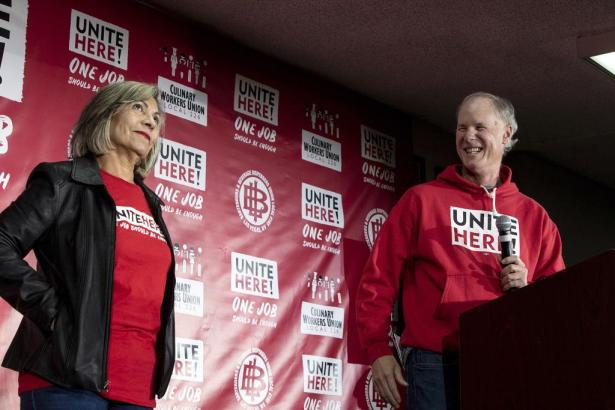Last Friday, D. Taylor stepped down as president of UNITE HERE—the union of hotel and casino employees. His nearly dozen years at the helm of one of America’s most member-involved unions saw it become an improbable political powerhouse in a host of swing states and key elections.
If anything, Taylor’s tenure coincided with industry practices that should have made already difficult union-building all the harder. These days, the people working behind the hotels’ registration desks and in kitchen and waitstaffs may well be employed not by the hotel itself but by contractors—a route hotel owners have taken precisely to thwart their workers going union. Despite that, UNITE HERE has continued to unionize hotel and casino workers not only in its Nevada stronghold and in such legacy cities as New York, but also in the otherwise non-union South. During Taylor’s presidency, the union not only organized 140,500 new workers, but fully half of them were in right-to-work states, which most unions shun for fear that workers benefiting from union contracts there would exercise their right not to pay union dues.
Which gets us to what’s really distinctive about UNITE HERE: It generally wins a level of worker allegiance that leads workers to join, and pay dues, even when they don’t have to. Las Vegas, where the local now claims roughly 60,000 members, has been ground zero for such successes. There, Taylor and his presidential predecessor, John Wilhelm, pioneered practices of involving workers in organizing, mobilizing, and bargaining at levels that are uncommon in most unions. That involvement has tended to pay off, literally, in the contracts the union has won.
During Taylor’s tenure, that involvement has also spurred the union’s political programs. Most unions still do politics by writing checks to the candidates they back, while some of the largest and disproportionately public employee unions—the two teacher unions, AFSCME and SEIU—can fund massive electoral operations that take to the airwaves and also have members and other canvassers knocking on doors and working the phones.
UNITE HERE doesn’t have that kind of treasury and can’t afford to hire non-member canvassers, as some unions do. But beginning in Nevada, where it’s long been much the biggest union, it has enlisted its hotel housekeepers, waiters, and cooks to become the state’s most potent door-knocking and phone-banking force, often alongside the Democratic machine built by the late Sen. Harry Reid. During Taylor’s tenure, the union began playing a similar role in other key swing states where its locals had similarly motivated members. In 2020, it mobilized many hundreds of its members in four swing states that gave Joe Biden the presidency: Arizona, Pennsylvania, Georgia, and, of course, Nevada. Its precinct walkers came from those states’ unionized hotels, as well as from those in such neighboring states as New York and California. Moreover, as UNITE HERE secretary-treasurer Gwen Mills (who now succeeds Taylor as president) told me in 2020, the union’s electoral training program for members also provides union organizing training as well.
In speaking with Taylor last month, he voiced both a cautious optimism about his union’s trajectory, and some frustration at the labor movement’s hesitation to exploit the unusually pro-union climate now abroad in the land. “Right now,” he said, “we have a high level of worker militance, the highest level of public approval of unions in 60 years, the most pro-union administration in our history, and a labor shortage that gives workers more power. If we fail to take advantage of all that, historians will say we didn’t do justice to the next generation of workers.”
Doing justice, in Taylor’s view, would require waging a unified labor campaign to organize the commanding heights of the economy—companies like Amazon. “That will take not one union but a powerful coalition of unions, a force like the CIO in the 1930s,” he said. “We have to increase union density if we’re ever going to reduce the crazy levels of economic inequality that we have. The whole movement needs to step up.”
Harold Meyerson is editor at large of The American Prospect.
The American Prospect is devoted to promoting informed discussion on public policy from a progressive perspective. In print and online, the Prospect brings a narrative, journalistic approach to complex issues, addressing the policy alternatives and the politics necessary to create good legislation. We help to dispel myths, challenge conventional wisdom, and expand the dialogue.


Spread the word